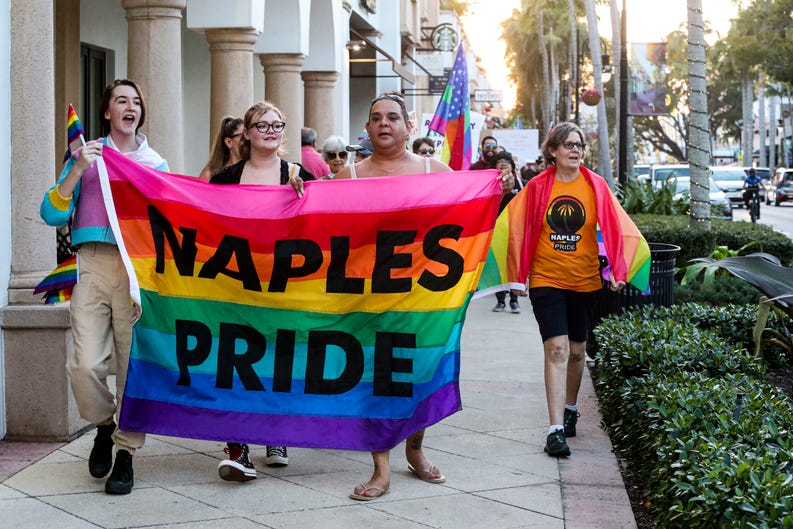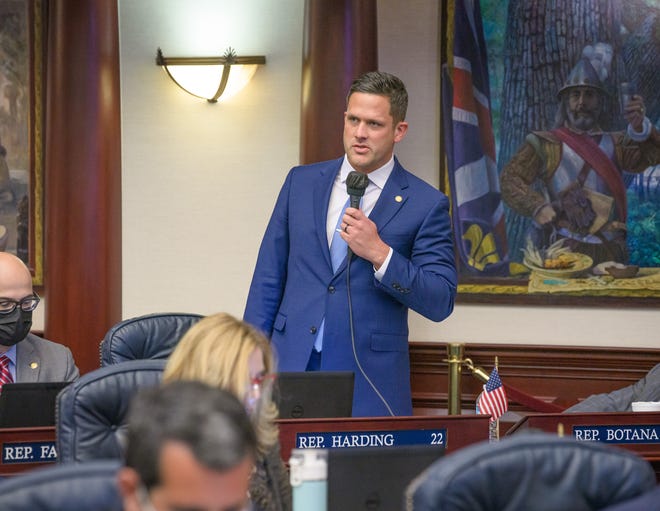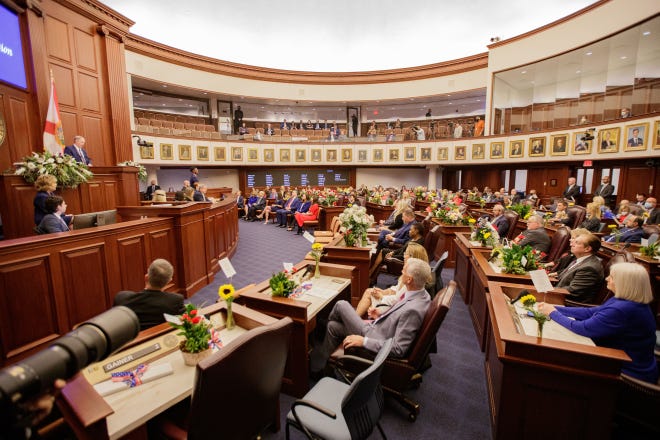
Lawmaker behind Florida ‘Don’t Say Gay’ bill yanks amendment requiring schools to out students
The bill seeks to regulate discussions in schools of sexual orientation and gender identity
Tallahassee Democrat | By Jim Rosica, Capital Bureau | USA TODAY NETWORK – FLORIDA | February 22, 2022
The original Florida House sponsor of what’s been dubbed the “Don’t Say Gay” bill on Tuesday suddenly withdrew an amendment to require school principals to disclose a child’s sexual orientation to parents within six weeks if they find out a student has come out as other than straight.
The amendment by Rep. Joe Harding, R-Williston, was to be debated and voted on the House floor Tuesday afternoon.
► Read the amendment as filed here.
But less than an hour before the House was set to convene, he withdrew the amendment.
In a statement, the state representative explained that “the exaggeration and misrepresentation in reporting about the amendment was a distraction; all the amendment did was create procedures around how, when and how long information was withheld from parents so that there was a clear process and kids knew what to expect.
“Nothing in the amendment was about outing a student. Rather than battle misinformation related to the amendment, I decided to focus on the primary bill that empowers parents to be engaged in their children’s lives,” he added.

The underlying bill still generally seeks to regulate discussions in schools of sexual orientation and gender identity, and would give parents the power to sue violators.
As previously reported by the USA TODAY Network, proponents say the legislation will empower parents to be involved in conversations about their students’ sexual identity.
Opponents say schools may be the only safe place for some kids to talk about their sexuality, and the bills will hurt kids who aren’t ready to come out to their parents or feel unsupported.
Originally, the idea was to protect students confiding in teachers, counselors and others, and who might be subject to “abuse, abandonment or neglect” if parents found out their sexual orientation.
Harding’s now-withdrawn amendment read in part that such knowledge has to be “based solely on child-specific information personally known to school personnel.”
“The school principal or his or her designee shall develop a plan, using all available governmental resources, to disclose such information within (six) weeks after the decision to withhold such information from the parent,” it adds.
That plan “must facilitate disclosure between the student and parent through an open dialogue in a safe, supportive, and judgment-free environment that respects the parent-child relationship and protects the mental, emotional, and physical well-being of the student,” according to the proposed language.
Earlier this month, President Biden personally called the legislation “hateful,” which prompted a response from Harding himself.
“The bill is designed to keep school districts from talking about these topics before kids are ready to process them,” the first-term lawmaker said. “I don’t think it’s controversial to empower parents ….
“Kids can and will talk about whatever they want at school. We just want to make sure teachers promote that discussion at the right age, and we want to make sure parents are kept in the loop.”
But Harding’s amendment acted as virtual gasoline on an online fire, stoking outrage from members of the LGBTQ community, including openly gay state Rep. Carlos Guillermo Smith, D-Orlando.
The amendment “make(s) it even more dangerous for vulnerable kids with a STATE-MANDATED outing of LGBTQ students to parents, specifically in cases of abuse, abandonment + neglect. This will have devastating consequences for our youth,” he tweeted.
Smith also cited research that LGBTQ youth are four times “more likely to seriously consider, make a plan for, or attempt suicide than their peers AND that at least one LGBTQ youth aged 13–24 attempts suicide every 45 seconds in the U.S.”
“#DontSayGay makes this worse,” he added.
Others posted on social media, “Imagine spending a second of your life looking for ways to shatter children,” and “School counselors need the ability to be a safe resource for all kids to open up to. #DontSayGay Bill would completely destroy that level of needed interaction.”
Another Twitter user who identifies as a “middle school math teacher” said, “This is the hill my 19 year career in education will die on. Never will I out one of my students. Ever. If they trust me to come and speak to me but not speak to their families??? I will protect them at all costs.”
But John Stemberger, an Orlando attorney and president of the conservative Florida Family Policy Council, countered on Twitter that the measure was “actually a ‘don’t turn my son into a daughter’ bill.”
A poll conducted Feb. 7-20 and released Tuesday by the Public Opinion Research Lab (PORL) at the University of North Florida found overall support for the measure at around 40%.
“When we break it down by party registration, we see 54% of Republicans supporting the bill, which is more in line with Florida’s Republican-controlled legislature,” said Dr. Michael Binder, Public Opinion Research Lab Director.
The House bill (HB 1557) moved through its two review committees with a combined vote of 28-12 to reach the House floor this week. A Senate companion (SB 1834) has cleared one committee there and still has two to go.
The Senate version caused a kerfuffle earlier this month when one Democratic lawmaker suggested it could also lead to lawsuits if a student wanted a veggie plate for lunch without a parent’s OK.

“If a student begins requesting vegetarian meals and the school provides it without telling the parent, is that a ‘critical decision’ ” that would allow a parent to sue the school district, asked state Sen. Lori Berman, D-Delray Beach.
Sen. Dennis Baxley, R-Ocala, the bill’s sponsor there, didn’t say yes or no but offered that “anything that relates to (students) should be part of the discussion with parents, not keeping parents in the dark.”
Both bills are formally called “Parental Rights in Education.”
The 2022 legislative session is scheduled to end March 11. A version of the legislation is expected to reach Gov. Ron DeSantis’ desk; if signed into law, it goes into effect July 1.





